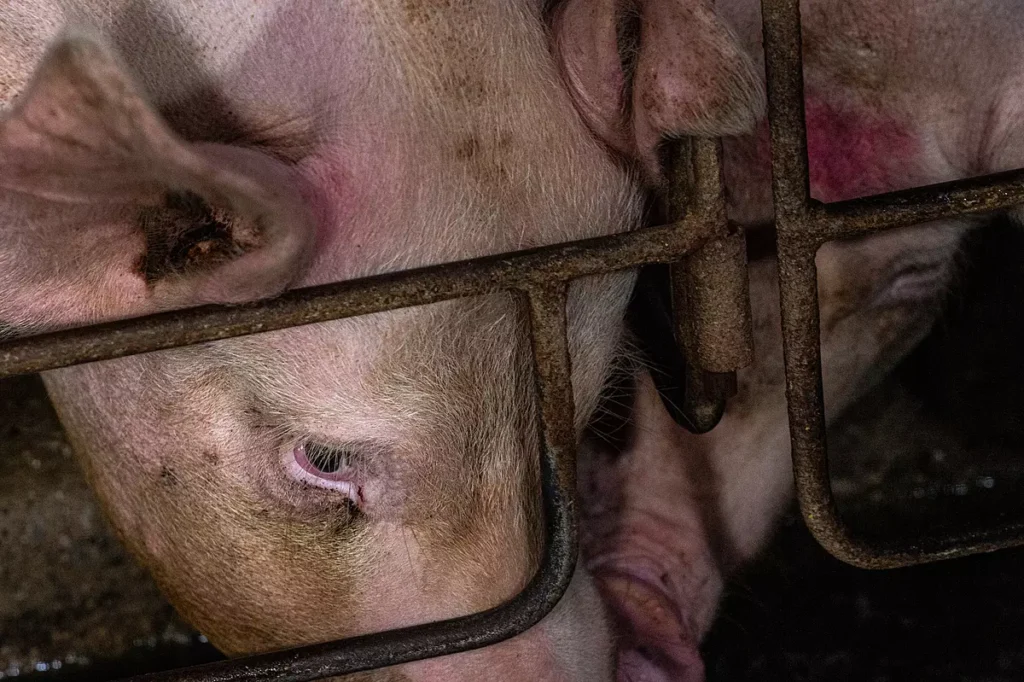New cast of pork companies replay losing arguments in U.S. District Court that U.S. Supreme Court already rejected in May 2023.
Washington, D.C. — Animal Wellness Action and the Center for a Humane Economy are responding to news that pork processors have once again asked a federal court to strike down Question 3 — a Massachusetts ballot initiative passed in a 2016 landslide vote requiring that breeding sows, laying hens, and veal calves have sufficient space to move, and also that all pork, eggs, and veal sold in the state come from compliant farms, no matter where the animals are reared.
Voters approved the measure 78% to 22%, and it finally took effect on August 24, 2023, after a series of dilatory maneuvers by the National Pork Producers Council and its agribusiness allies in the courts.

Triumph Foods and a handful of other midwestern pork producers brought this latest case against the Massachusetts Attorney General, arguing that the law discriminates against out-of-state farmers and is, therefore, illegal under the dormant Commerce Clause.
Question 3, like California’s Proposition 12, requires that any pork sold in the state come from operations where pregnant sows are given room to stand up, sit down and turn around, rather than kept cruelly confined in immobilizing gestation crates. The Supreme Court of the United States upheld Prop 12, and by inference Question 3, declaring that the measures were a proper exercise of state authority and constitutional. In short, the high court determined that states can place limits on commerce in pork and eggs if they are non-protectionist and grounded on core concerns about animal welfare and food safety.
“A U.S. District Court should throw out this spoiled legal hash from pork industry giants who just cannot accept the judgment of voters in Massachusetts or the ruling by the Supreme Court of the United States that the law is constitutionally sound,” said Wayne Pacelle, president of Animal Wellness Action and the Center for a Humane Economy and a key architect of the ballot measure.
“Thislatest legal maneuver smacks of desperation, partly because a separate Congressional maneuver to overturn the laws is languishing. The industrialized pork industry has stooped to specious and frivolous courthouse filings,” he said.
Triumph Foods and its co-plaintiffs concede in their latest motion that Question 3 treats both in-state and out-of-state pork producers evenhandedly with the prohibition on gestation crates applying to all growers regardless of where they are located, but argue that because no Massachusetts pig farmers currently use these cruel confinement systems, the law will unfairly — and discriminately — impact out-of-state growers.
In the May 2023 ruling on Prop 12 — which was a clone of Question 3 decided by voters two years earlier — Justice Neil Gorsuch, writing for majority, had this to say about the discrimination argument now being raised by this new round of litigation:
Even under our received dormant Commerce Clause case law, petitioners begin in a tough spot. They do not allege that California’s law seeks to advantage in-state firms or disadvantage out-of-state rivals. In fact, petitioners disavow any discrimination-based claim, conceding that Proposition 12 imposes the same burdens on in-state pork producers that it imposes on out-of-state ones. As petitioners put it, “the dormant Commerce Clause . . . bar on protectionist state statutes that discriminate against interstate commerce . . . is not in issue here.
“Not only should the court summarily reject the plaintiffs’ latest argument,” Pacelle said, “it should also consider legal sanctions. This frivolous filing is a waste of critical courthouse and state resources and an improper attempt to subvert democracy.”
Dozens of major U.S. food retailers, including McDonald’s and Costco, already have promised their consumers that they will forbid sourcing pork or eggs from operations that confine the sows or hens in extreme ways.
More than 230 lawmakers, including the entire Massachusetts Congressional delegation, have announced their opposition to the so-called Exposing Agriculture Trade Suppression Act (EATS) Act, also advanced by NPPC. It is a partisan measure to nullify laws that place any limits on agricultural commerce, even though it is aimed at overturning Question 3 and Prop 12.
The National Pork Producers Council has come up on the losing side on five of five ballot measures on gestation-crate confinement, each one by double-digit margins. It lost 12 of 12 court cases challenging Prop 2 and Prop 12, including the SCOTUS ruling in May 2023. The NPPC also lost the debate with 60 major food retailers, including giants in food retail such as McDonald’s, Costco, and Safeway that have strong anti-gestation-crate policies. In July, Governor Phil Murphy signed a ban on gestation crates in New Jersey after the Assembly passed a ban on gestation crates 73 to 1 and the Senate passed the measure 35 to 1.

